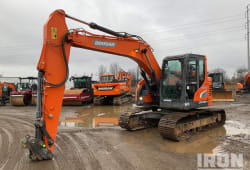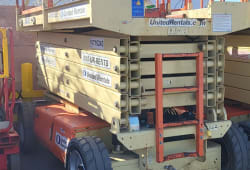Significance of Construction Associations & Industry Networks for Development
13 Lectura mínima
)
agosto 10, 2023
In the construction industry, collaboration and knowledge sharing are vital for development and growth. Construction associations and industry networks play a crucial role in bringing together professionals, companies, and organizations to foster innovation, promote best practices, and advocate for the industry's interests. In this article, we will explore the significance of construction associations and industry networks, highlight key associations around the world, discuss their impact on construction development, showcase successful projects, and examine future trends.
Understanding the Role of Construction Associations
Construction associations serve as intermediaries between professionals, companies, and government entities. They provide a platform for stakeholders to connect, collaborate, and address common challenges. These associations offer various benefits, including:
Advocacy and Legislation: Construction associations actively engage with policymakers to shape legislation, regulations, and policies that impact the industry. They represent the collective interests of their members, lobbying for favorable conditions and advocating for the industry's growth.
Education and Training Opportunities: Construction associations play a vital role in providing educational resources and training programs to enhance industry skills and knowledge. They organize workshops, seminars, and certification programs to promote continuous professional development.
Networking and Industry Events: Construction associations facilitate networking opportunities through industry events, conferences, and forums. These gatherings enable professionals to exchange ideas, collaborate on projects, and stay updated on the latest industry trends and advancements.
Advocacy and legislation are crucial aspects of construction associations. They actively work with policymakers to ensure that the industry's voice is heard and considered when shaping legislation, regulations, and policies. By representing the collective interests of their members, construction associations can lobby for favorable conditions that promote growth and sustainability in the industry. This advocacy role is essential in fostering a conducive environment for construction professionals and companies to thrive.
In addition to advocacy, construction associations also focus on providing educational resources and training opportunities. They understand the importance of continuous professional development and strive to enhance industry skills and knowledge. Through workshops, seminars, and certification programs, construction associations enable professionals to stay updated with the latest industry practices, technological advancements, and regulatory requirements. By investing in education and training, these associations contribute to the overall improvement of the industry's workforce.
Furthermore, construction associations create networking opportunities through various industry events, conferences, and forums. These gatherings serve as platforms for professionals to connect, collaborate, and exchange ideas. By fostering a sense of community and facilitating networking, construction associations encourage collaboration between different stakeholders in the industry. This collaboration, in turn, can lead to innovative solutions, improved project outcomes, and the sharing of best practices.
Overall, construction associations play a vital role in the construction industry. They act as intermediaries, bringing professionals, companies, and government entities together. Through advocacy, education, and networking opportunities, these associations contribute to the growth, development, and success of the construction industry as a whole.
Key Construction Associations Around the World
Construction associations exist globally to support the diverse needs of professionals in different regions. Let's explore some of the leading construction associations:
North America's Leading Construction Associations
In North America, several prominent construction associations play a significant role in shaping the industry:
Association of General Contractors (AGC) of America The Association of General Contractors (AGC) of America is one of the oldest and largest construction associations in the United States. With a history dating back to 1918, the AGC represents more than 27,000 firms, including general contractors, specialty contractors, and service providers. The association provides its members with a wide range of resources, including educational programs, safety training, and advocacy efforts to promote the industry's interests at the national level.
American Institute of Architects (AIA) The American Institute of Architects (AIA) is a professional organization that represents architects and design professionals in the United States. With over 95,000 members, the AIA is dedicated to advancing the practice of architecture and promoting the value of design. The association offers various resources, such as continuing education programs, networking opportunities, and advocacy efforts to support its members in their professional development.
Constructors Association of Western Pennsylvania (CAWP) The Constructors Association of Western Pennsylvania (CAWP) is a regional construction association that represents contractors, subcontractors, and suppliers in the western part of Pennsylvania. The association focuses on promoting the construction industry's growth and development in the region by providing its members with networking opportunities, educational programs, and advocacy support.
These associations provide valuable resources, promote best practices, and foster collaboration among industry professionals.
European Construction Associations to Know
Europe is home to a diverse range of construction associations, including:
Fédération Internationale des Ingénieurs-Conseils (FIDIC) The Fédération Internationale des Ingénieurs-Conseils (FIDIC) is an international federation of consulting engineers. It represents professional consulting engineering associations from around the world and aims to promote and implement best practices in the consulting engineering industry. FIDIC develops standard contracts and guidelines that are widely used in international construction projects, ensuring a fair and balanced approach to contractual relationships.
Federation of European Construction Industries (FIEC) The Federation of European Construction Industries (FIEC) is the representative organization for the European construction industry. It brings together national construction federations from across Europe and advocates for the interests of the construction sector at the European Union level. The FIEC focuses on promoting a competitive and sustainable construction industry, supporting innovation, and shaping EU policies related to construction.
Construction Industry Federation (CIF) Ireland The Construction Industry Federation (CIF) is the representative body for construction companies and employers in Ireland. It works to promote and develop the construction industry in Ireland by providing its members with a range of services, including training programs, networking events, and policy advocacy. The CIF plays a crucial role in shaping construction-related policies and regulations in Ireland, ensuring a favorable business environment for the industry.
These associations work towards developing common standards, promoting sustainability, and driving industry growth across the continent.
Emerging Construction Associations in Asia
Asia has witnessed rapid infrastructure development, leading to the emergence of several construction associations:
Building and Construction Authority (BCA) Singapore The Building and Construction Authority (BCA) of Singapore is a statutory board under the Ministry of National Development. It regulates the construction industry in Singapore, ensuring high standards of quality and safety. The BCA also promotes the adoption of advanced construction technologies and sustainable building practices to enhance the country's built environment.
China Construction Industry Association (CCIA) The China Construction Industry Association (CCIA) is a national industry association representing construction companies and professionals in China. It plays a crucial role in promoting the development of China's construction industry, fostering international cooperation, and advocating for the interests of its members. The CCIA works closely with government agencies to shape policies and regulations that support the industry's growth.
Japan Federation of Construction Contractors (JFCC) The Japan Federation of Construction Contractors (JFCC) is an industry association that represents construction contractors in Japan. It works to improve the construction industry's competitiveness, promote fair business practices, and enhance the professionalism of its members. The JFCC also collaborates with government agencies and other stakeholders to address industry challenges and drive innovation in the construction sector.
These associations focus on advancing construction techniques, fostering innovation, and improving project management practices.
The Impact of Industry Networks on Construction Development
Industry networks complement the efforts of construction associations by facilitating collaboration and partnership. These networks have a profound impact on construction development in several ways:
Enhancing Collaboration and Partnership
Industry networks provide a platform for professionals and organizations to collaborate on projects, share expertise, and form strategic partnerships. By fostering collaboration, these networks drive innovation and promote the delivery of high-quality construction projects.
For example, within these industry networks, construction professionals can connect with architects, engineers, and suppliers to exchange ideas and best practices. This collaboration can lead to the development of groundbreaking designs and construction techniques that push the boundaries of what is possible in the industry. Through these partnerships, construction projects can benefit from the collective knowledge and experience of multiple experts, resulting in more efficient and successful outcomes.
Furthermore, industry networks often organize conferences, workshops, and seminars where construction professionals can come together to discuss challenges and opportunities in the field. These events create a space for networking and knowledge sharing, fostering a sense of community and collaboration among industry stakeholders.
Promoting Innovation and Technology Adoption
Construction industry networks are at the forefront of promoting innovation and technology adoption. Through knowledge sharing, events, and initiatives, these networks encourage the implementation of cutting-edge technologies, such as Building Information Modeling (BIM) and the Internet of Things (IoT), leading to improved project efficiency and sustainability.
Within industry networks, construction professionals have the opportunity to stay updated on the latest technological advancements and trends. They can attend workshops and training sessions focused on the practical application of these technologies, allowing them to enhance their skills and knowledge. By embracing these innovations, construction projects can benefit from increased accuracy, reduced costs, and streamlined processes.
Moreover, industry networks often collaborate with technology providers and research institutions to develop and promote new tools and methodologies. For instance, they may organize hackathons or innovation challenges to encourage the creation of innovative solutions for common construction challenges. By driving the adoption of technology, industry networks contribute to the overall advancement and competitiveness of the construction industry.
Driving Sustainability in Construction
Industry networks play a pivotal role in driving sustainability in the construction sector. By exchanging best practices, sharing research findings, and organizing sustainability-focused events, these networks contribute to creating environmentally friendly and socially responsible construction practices.
Within industry networks, sustainability is a key focus area. Professionals from various disciplines collaborate to develop strategies and initiatives that promote sustainable construction. This includes exploring renewable energy options, implementing green building practices, and adopting materials and construction methods that minimize environmental impact.
Industry networks also serve as a platform for sharing research and case studies on sustainable construction projects. Through conferences and publications, professionals can learn from successful examples and apply those learnings to their projects. By disseminating knowledge and promoting sustainable practices, industry networks contribute to the overall improvement of the construction industry's environmental footprint.
Furthermore, industry networks often collaborate with government agencies and regulatory bodies to advocate for policies and regulations that support sustainable construction practices. By leveraging their collective influence, these networks can shape the industry's approach to sustainability and drive positive change on a larger scale.
Case Studies: Successful Projects Through Industry Networks
Let's explore some case studies that demonstrate the positive impact of industry networks on successful construction projects:
Infrastructure Development Case Study
In a collaborative effort facilitated by a construction industry network, a team of architects, engineers, and contractors completed the construction of a major transportation hub. The project achieved seamless integration of multiple modes of transportation, reducing congestion and improving connectivity in the region.
The construction industry network played a crucial role in bringing together various stakeholders, including government agencies, transportation authorities, and private sector organizations. Through regular meetings, workshops, and knowledge-sharing sessions, the network fostered a sense of collaboration and cooperation among the project team.
By leveraging the expertise and experience of network members, the project team was able to overcome complex engineering challenges and ensure the smooth execution of the construction process. The network also provided access to cutting-edge technologies and best practices, enabling the team to incorporate innovative solutions into the transportation hub's design.
Furthermore, the industry network facilitated the establishment of strategic partnerships with suppliers, enabling the project team to source high-quality materials at competitive prices. This not only contributed to the project's success but also helped to optimize costs and maximize value for money.
Residential Construction Case Study
A residential construction project benefitted from an industry network's support, resulting in the completion of a sustainable housing development. Energy-efficient design principles, materials, and technologies were incorporated, creating environmentally friendly homes that meet the needs of future generations.
The industry network played a pivotal role in promoting sustainability and green building practices throughout the project. By connecting the residential construction team with experts in sustainable design and construction, the network facilitated the integration of energy-efficient systems, such as solar panels, smart home technologies, and rainwater harvesting systems.
In addition to technical expertise, the industry network guided obtaining green certifications and complying with environmental regulations. This ensured that the residential development met the highest standards of sustainability and contributed to the overall well-being of the community.
Moreover, the network facilitated knowledge-sharing sessions and workshops on sustainable construction practices, enabling the project team to stay updated with the latest trends and advancements in the field. This continuous learning and exchange of ideas further enhanced the quality and innovation of the residential construction project.
Commercial Construction Case Study
Through an industry network's collaboration, a commercial construction project was delivered ahead of schedule and under budget. The network facilitated knowledge exchange, enabling the project team to adopt innovative construction techniques and streamline processes, enhancing project efficiency and profitability.
The industry network served as a platform for sharing best practices, lessons learned, and success stories from similar commercial construction projects. By connecting the project team with experienced professionals and industry leaders, the network provided valuable insights and guidance on project management, cost control, and risk mitigation.
Furthermore, the network organized workshops and training sessions on lean construction principles and methodologies, enabling the project team to optimize resource allocation, minimize waste, and improve productivity. This resulted in significant time and cost savings, allowing the commercial construction project to be completed ahead of schedule and within the allocated budget.
Additionally, the industry network facilitated collaboration with technology providers and suppliers, leading to the adoption of advanced construction technologies, such as Building Information Modeling (BIM) and prefabrication. These technologies not only accelerated the construction process but also enhanced the quality and precision of the final deliverables.
In conclusion, industry networks play a vital role in driving successful construction projects. By fostering collaboration, knowledge-sharing, and innovation, these networks enable construction professionals to overcome challenges, optimize resources, and deliver projects that meet the highest standards of quality, sustainability, and efficiency.
Future Trends in Construction Associations and Networks
Looking ahead, construction associations and industry networks are poised to adapt to evolving practices and technologies. Some future trends include:
The Rise of Digital Networking
With the increasing reliance on digital communication, construction associations, and industry networks are embracing online platforms and virtual events to connect professionals globally. Online networking will provide more opportunities for global collaboration and knowledge sharing.
Sustainability as a Core Focus
As sustainability becomes a critical consideration in the construction industry, associations and networks will prioritize advancing sustainable practices. They will drive initiatives to reduce carbon footprint, promote renewable energy solutions, and advocate for sustainable construction materials and techniques.
The Impact of Globalization on Construction Networks
The globalization of the construction industry will necessitate stronger collaboration and information-sharing among construction associations and networks worldwide. These networks will play a pivotal role in bridging cultural and regional gaps to foster international partnerships and drive global construction development.
In conclusion, construction associations and industry networks are essential for the industry's development. From advocacy and education to networking and collaboration, these organizations provide a platform for professionals and companies to come together, share knowledge, and drive innovation. With the emergence of new technologies and the growing need for sustainable practices, construction associations, and networks will continue to evolve, shape the industry, and lead construction development into the future.

Post acquisition of Boom & Bucket, the company he founded, Adam now leads Marketplace Growth for Ritchie Bros.














